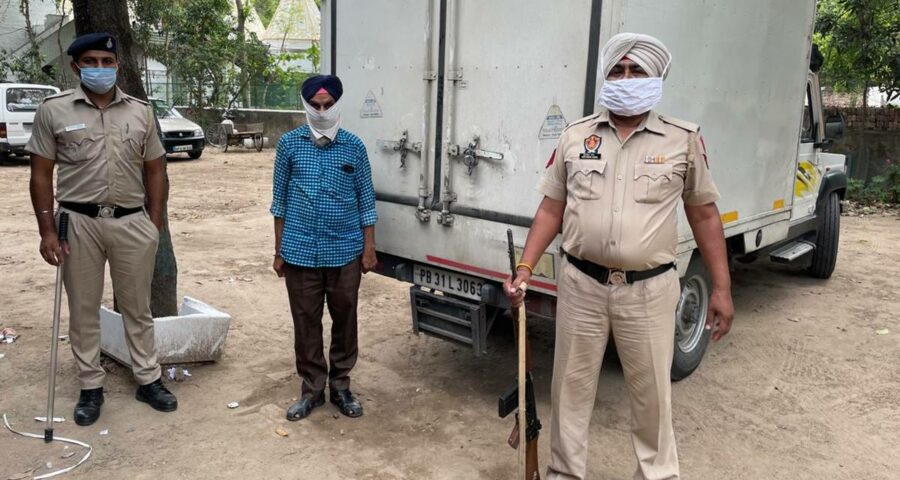A look at the working of Punjab govt’s vaccine store, where staff work overtime to ensure that vaccines reach the districts on time. Punjab, Chandigarh police also keep an eye on the stock 24×7.
Few minutes after the ‘vaccine van’ from district Ropar exited the premises, the one from Mansa has chugged in, to collect its allocated doses of Covid vaccines, and Shambhu, an attendant at Punjab government’s State Vaccine Store is on the job to ensure that every single dose is counted and entered in the records before being loaded in the vehicle.
Since the national vaccination programme against Covid was started in January this year, the Punjab government’s State Vaccine Store in Chandigarh’s Sector 24-A, otherwise a quiet premises amid lush greens of the City Beautiful, has turned into a hotspot of 24×7 activity where vaccine vans from 22 districts of the state keeping checking in and out to collect their allocated doses of Covishield and Covaxin — and the syringes.
A team of five cops at least — four from Punjab Police and one from Chandigarh Police — are always on duty outside the building to keep an eye on movement of each vehicle bringing in or taking away the vaccines.
The staff deputed at the store — a cold chain officer, a technician, and four attendants — say that since Covid vaccinated has started, their entire working pattern and hours have undergone a complete turnaround because there is no specified timing of when vaccines stocks arrive from flights via Pune (Covishield produced by Pune-based Serum Institute of India) or by road from Karnal (from Government of India’s warehouse). The process of distributing the received stock among districts then starts, each vaccine van chugging in one by one from morning till late in the night.
“Our only work and priority right now is that not a single district gets delayed delivery because of us, even if that means working till late in night…It was earlier a 9 to 5 job like others do but now we work at least 12 hours a day, overtime and without any specific timings,” says Jatinder Mohan, the cold chain store officer.
“Sometimes vaccine vans from border districts such as Gurdaspur, Pathankot and Tarn Taran arrive very late, even around midnight but we never stop them. It is better to deliver the vaccines overnight so that process to administer the doses is not delayed the next day. Before Covid vaccination started, we also worked like other typical government employees — at 5 pm the vaccine store used to be closed but now there are no timings. The most important task and duty at hand is to ensure that vaccine stock reaches districts immediately without any delay,” says Mohan.
The state’s vaccine store is equipped with two walk-in coolers and two walk-in freezers and there is capacity to store at least 25-30 lakh vials in one go. “But the supply of Covid vaccines is already neck and neck. As soon as stocks arrive from Centre (Ministry of Health and Family Welfare supplies vaccines for 45+ age group) or from SII Pune via flight (doses for 18-44 age group are directly ordered by state government from the companies), districts are immediately informed to send their vaccine vans and collect their doses. So, hardly any bulk stock of Covid vaccines stay here for long,” he says.
Covid vaccines are mostly stored in walk-in coolers (which maintain temperature of 2 to 8 degrees Celsius) while walk-in freezers are for the vaccines that require temperature of minus fifteen to minus twenty-five degrees. From state vaccine store, vaccines reach 729 cold chain points across state from where they reach hospitals/rural health centres.
The staff here is also entrusted with the duty to collect supplies of Covishield and Covaxin, count each vial and then enter the data on GoI’s CoWin app.
“There is no particular time of when the supplies arrive. We have to visit the airport whenever supplies come in from Pune, then count each vial received and confirm on CoWin that we have got the supplies. When the supplies come from GoI’s Karnal warehouse by road, sometimes their vaccine van is overburdened so we send our vehicle to collect them,” says Mohan.
However, the irony is that while districts have their own insulated vaccine vans to collect the supplies, the vaccine store is yet to have its own vehicle for emergency needs. “We borrow vehicles from nearby Mohali and Fatehgarh Sahib districts whenever there’s an emergency to collect/deliver vaccine supplies. We have been told our own vaccine van is also arriving soon. Let’s see when it comes,” says Mohan.
“Mahaamaari to sab ke liye aayi hai, sirf hamare liye nahi… kabhi kabhi acha bhi mehsoos hota hai ki humein ye kaam karne ka mauka mil raha…” (Pandemic is for everyone, not just us. Sometimes it also feels good that we have got this opportunity to do this crucial work (of taking care of vaccines),” he signs off.
Source: Read Full Article




